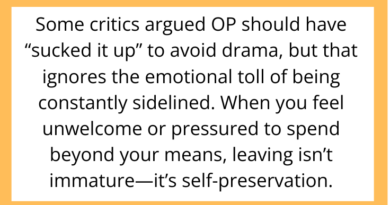AITAH for Not Wanting to Pay for My Girlfriend’s Student Loans?
Money can test even the strongest relationships. But when financial expectations aren’t clearly defined, resentment can brew fast. In this AITAH scenario, a young professional wonders if he’s wrong for refusing to take on a burden he never agreed to carry: his girlfriend’s student debt.
Let’s dive into the details and see where the lines between love, responsibility, and fairness really fall.
The Background: Debt That Was Never His

The original poster (we’ll call him Mark), a 28-year-old software engineer, has been dating his girlfriend, Laura, for three years. They recently moved in together and started talking seriously about marriage. While discussing their future finances, Laura confessed she has over $90,000 in student loans from her undergraduate and graduate degrees.
Mark knew she had some debt—but not how much. He was surprised by the total and even more shocked when Laura said she expected they would “tackle it together” once they got married.
Mark was hesitant. He had no debt himself, having worked through college and lived frugally. The idea of pooling finances to pay for loans he never benefitted from felt unfair. He told Laura he’d support her emotionally and help budget, but he wasn’t willing to contribute his own income toward her payments.
Laura was devastated. She accused Mark of not being committed to their future and said she felt “abandoned” and “devalued.” Their conversation spiraled into a major argument, with Laura eventually storming out to stay with a friend.
Feeling conflicted, Mark turned to Reddit’s r/AITAH community to ask: Am I the villain for not wanting to pay off my girlfriend’s debt?
Where Reddit Stands: Is It Love or a Transaction?

The community responded with thousands of comments—and the majority sided with Mark.
Why Mark May Not Be the Villain
-
Transparency: Laura didn’t disclose the full amount of her debt until years into the relationship.
-
Consent: Mark never agreed to take on her loans, and he was honest about his feelings.
-
Autonomy: Marriage is a partnership, but that doesn’t mean every financial obligation automatically becomes shared.
-
Precedent: Many couples choose to keep pre-marital debts separate, especially when one partner worked hard to stay debt-free.
One commenter summed it up perfectly:
“Supporting someone emotionally isn’t the same as co-signing their financial past.”
Why Some People Think Mark Is Being Shortsighted

A smaller but vocal group argued that Mark’s refusal could signal deeper issues:
-
Future Entanglement: Marriage usually means shared finances, whether you like it or not.
-
Partnership: Helping pay debt could be seen as an investment in their future stability together.
-
Empathy: Student loans are a common burden, and refusing to help might feel cold or transactional.
Some suggested Mark consider contributing a small, manageable amount or helping Laura refinance to reduce interest, as a show of good faith.
The Bigger Question: What Do You Owe a Partner Financially?

This situation highlights the importance of discussing money early and openly. Before moving in, getting engaged, or merging finances, couples should talk about:
-
Debt balances and repayment plans
-
Attitudes toward budgeting and spending
-
Expectations for shared expenses
-
Long-term goals like buying a house or saving for retirement
For Mark and Laura, this conversation came late—and it turned into a conflict about values and fairness instead of a plan for the future.
Could There Have Been a Middle Ground?

Sometimes, compromise can help preserve trust and goodwill. A few Redditors proposed these options:
-
Separate Finances with a Joint Budget: Each partner keeps their own accounts but contributes proportionally to shared bills.
-
Prenuptial Agreement: If marriage happens, set clear terms around pre-existing debts.
-
Emotional, Not Financial, Support: Mark could help Laura create a debt repayment strategy without using his income.
-
Transparency Moving Forward: Agree never to hide or minimize significant financial information again.
Boundaries Aren’t the Same as Rejection

One theme emerged repeatedly in the comments: You can love someone fully without taking on every part of their past. Setting financial boundaries doesn’t automatically mean you don’t care.
It often means you do care—about staying on solid ground together rather than risking resentment or imbalance.
The Takeaway: Debt and Love Need Clarity

Mark isn’t automatically the villain for refusing to pay Laura’s student loans. He’s someone with clear financial boundaries, and those boundaries should be respected. Laura’s disappointment is understandable, but disappointment alone doesn’t obligate Mark to change his principles.
This scenario underscores why financial compatibility is just as important as emotional compatibility. Avoiding these tough conversations doesn’t make them disappear—it just delays the inevitable reckoning.



